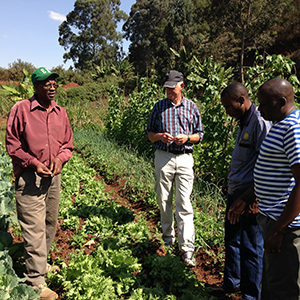Organic farming collaboration is growing in East Africa
The international project ProGrOV has created a platform where researchers and organic movements in East Africa are sharing knowledge and experiences in order to develop the organic farming sector.

By Esther Waweru
Collaboration between universities and non-governmental organisations can have many benefits. However, bridging the gap between the research environment and practice can sometimes be a challenge. The project, ‘Productivity and Growth in Organic Value Chains (ProGrOV) addresses that problem by creating a platform where researchers and organic farming movements in East Africa share knowledge and experience in order to develop the organic food farming sector.
ProGrOV focuses on improving productivity and growth in existing organic value chains in Uganda, Kenya and Tanzania through research that addresses development of agro-ecological methods, governance, management of organic value-chains, and capacity development in participatory and interdisciplinary approaches.
Experience has shown that there are many coinciding areas in which to collaborate, such as problem identification, research needs, fieldwork facilitation, data collection trainings and dissemination. The result is participatory research.
Farmers and researchers collaborate
Before the project, the Universities from the three countries had little association with the organic movements of their countries even though one of the universities (Sokoine University of Agriculture Tanzania) had organic agriculture in their curriculum. However since the start of ProGrOV, their collaboration emerged to be one that was crucial for the success of the project as well as beneficial to both the academic institutes and the organic movements. Some of the gains realised through the project include:
- Identification and prioritization of relevant research areas:
The project approach encouraged having all parties involved in the project formulation and the inception of the project ensured that research questions were relevant to problems faced in the field. - Stakeholders’ engagement:
Collaboration links the university and the organic sector stakeholders, such as policy makers, exporters and farmers. Much of the research data was generated from or through stakeholder engagement and their involvement contributed to enriching research. - Dissemination and communication:
There are arrangements that synthesised research findings will be translated through national organic movements into popular language, thus easing dissemination.